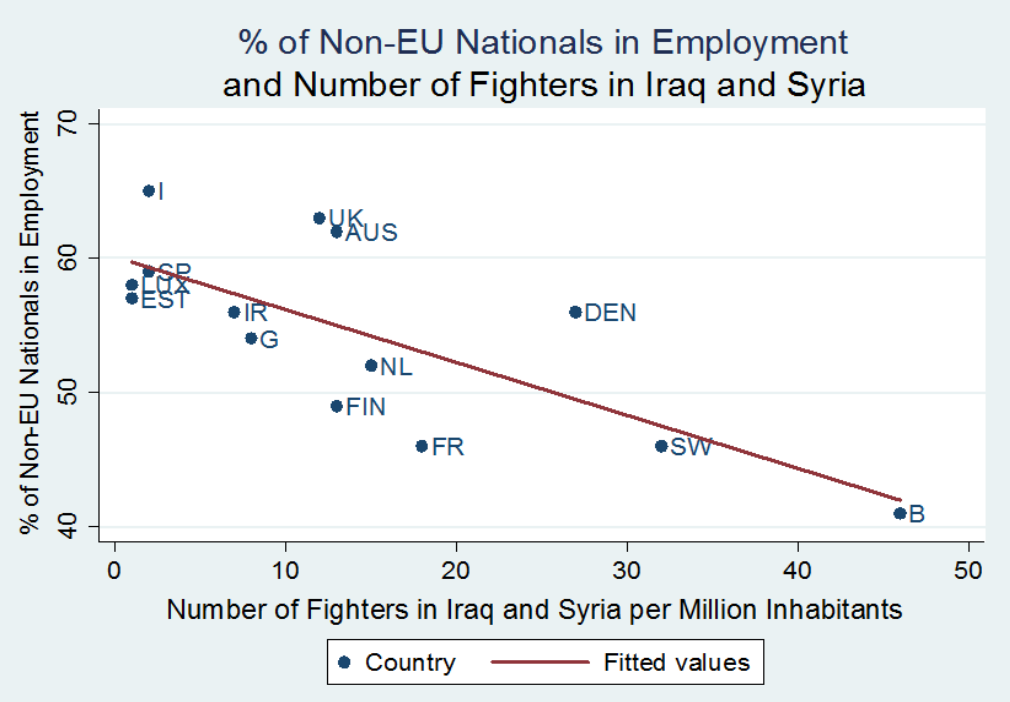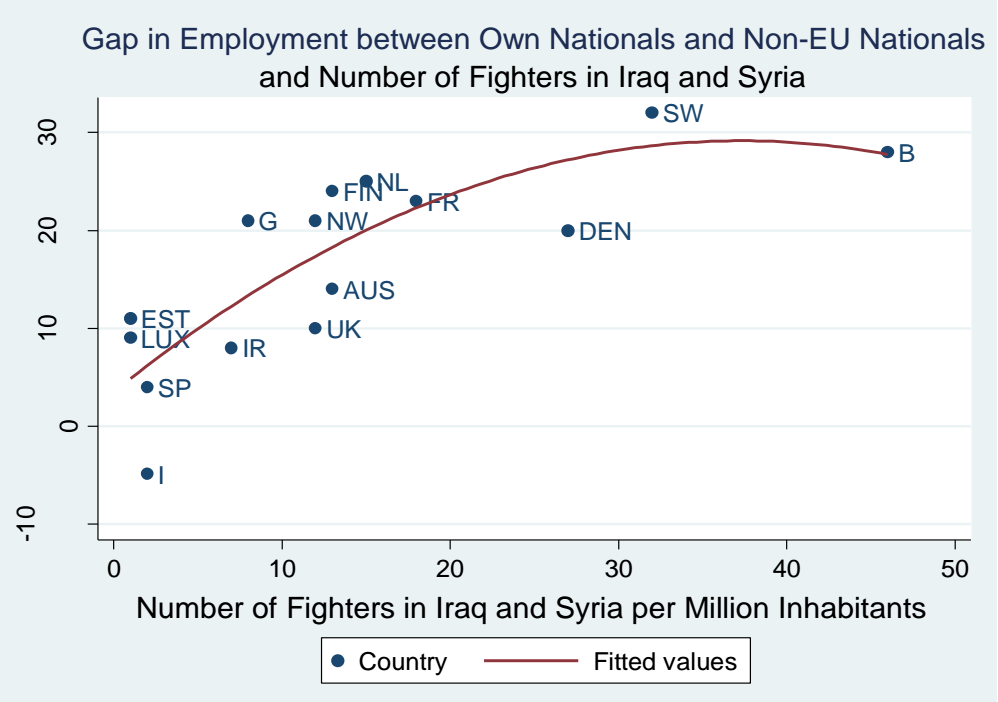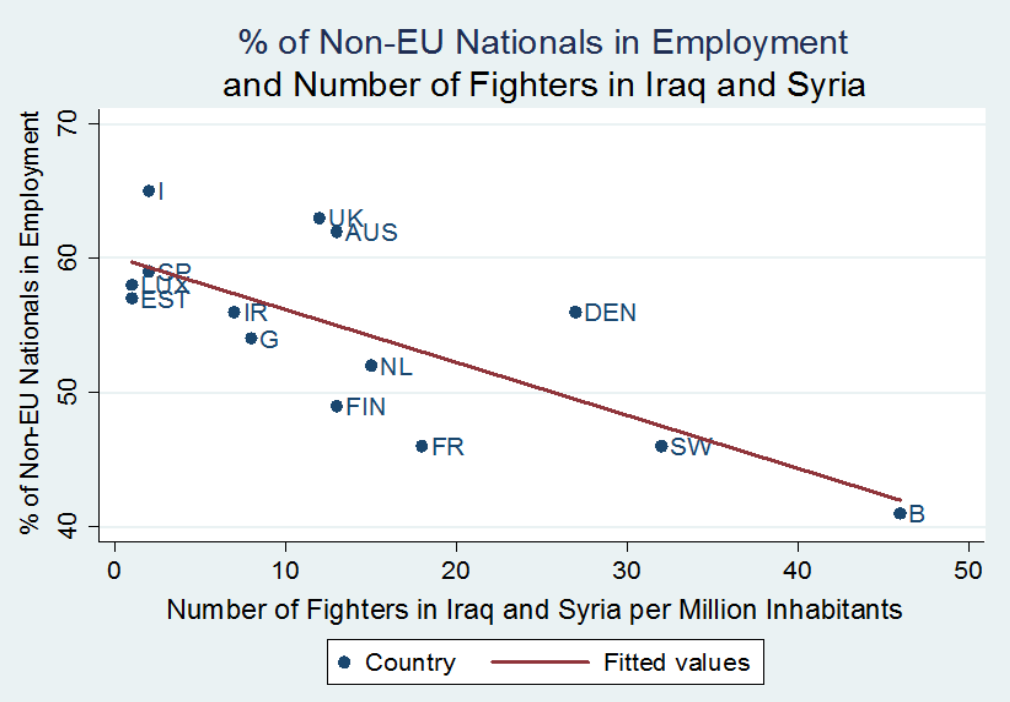 Yes and no, says Philip Verwimp, a Belgian economist who studies violence. The graph above plots non-European-born employment levels in Europe against estimated ISIS recruitment. Way over on the right, B is Belgium.
Yes and no, says Philip Verwimp, a Belgian economist who studies violence. The graph above plots non-European-born employment levels in Europe against estimated ISIS recruitment. Way over on the right, B is Belgium.
[Note: See updates from Philip Verwimp at the end]
While the foreign-born cannot get jobs, Belgian nationals can. This graph shows that Belgium has the biggest employment gap between nationals and non-European-born in all of Europe:

You might think this is an unemployment-causes-violence kind of argument, but it is not. It’s possible, but Verwimp knows that this runs against most of the evidence, which finds little association between poverty and violence.
Here is Verwimp:
Belgium has a very elaborate welfare state. All citizens have health coverage, schools and universities charge no or few fees, child benefits, unemployment benefits, pensions, are all in place. But this comes at a cost of a closed labour market, meaning a labour system that heavily protects those who are in, but makes entry for newcomers very difficult.
It does not seem to be poverty, but exclusion. Philip wrote to me:
One of my students from African origin, graduating from our MA program, told me (before the Paris attacks) « it is easier to get unemployment benefits in Belgium than to get a job ». He decided to move to Canada. That summarises it. Migrants and their families have full access to the allocations of the welfare state, but face daunting challenges when they want to get ahead in life.
…I am not looking at individual factors to join IS, as young adults across European cities many share similar reasons, but for ‘structural’ factors that make the situation different in some countries compared to others.
Why is there exclusion from labor markets? Verwimp argues it’s not all education or other selection. In their work on France, Adida, Laitin, and Valfort have made a persuasive case that it’s discrimination, though it might be discrimination on where you’re from rather than anti-Muslim feelings. [Actually, this may have been an error of mine—see below]
Another possibility I find quite plausible: the shame and injustice of exclusion, not poverty, is what leads so many to rebel. This is possibly one of the hardest propositions in social science to test.
If you want to read all the evidence I know, here is my review of the employment and violence literature. It is a work in progress, so comments welcome.
Updates:
- At Vox, Jennifer Williams took Philip and me to task for oversimplifying the debate.
- She has a point, especially in that I was a bit glib. But clickbait headlines aside (which, ironically, Ezra Klein and Vox convinced me was actually a principled way to get people to read research) I don’t think we oversimplified.
- Maybe the difference is this: some people believe armed mobilization is different for everyone, while others think that there are some systematic forces at work alongside the idiosyncrasies. WIlliams sounds like she leans to the first approach, Philip and I the second.
- This is what quantitative social science does: it finds the signal and systematic patterns in the noise. Philip’s simple cross country comparison was just a thought piece, and isn’t conclusive. But if you ask me, social science does (and will continue) to vindicate the idea that social exclusion and discrimination is a powerful driver of rebellion and extremism. Probably we all agree on this and so we’re arguing at nothing.
- In response to a huge amount of discussion, Philip revised his analysis of the correlation between socioeconomic outcomes and the number of Syria Fighters by looking at the second generation of migrants apart from the first generation.
- Claire Adida writes me about an error I made: “our study actually indicates that the discrimination we have identified in France is Islamophobia, not xenophobia. Our book, recently published by Harvard University Press, goes into greater detail on this.
- Tyler Cowen at first panned the book, but then posted the authors’ thoughtful response. Worth reading, if only as an example of how to respond to critics in a dignified way.


79 Responses
RT @viewfromthecave: Exclusion, not unemployment, explains ISIS recruitment? @cblatts highlights some interesting research https://t.co/eaX…
#Exclusion, not unemployment, explains #ISIS recruitment? https://t.co/F3d6RqQb6X
RT @viewfromthecave: Exclusion, not unemployment, explains ISIS recruitment? @cblatts highlights some interesting research https://t.co/eaX…
RT @viewfromthecave: Exclusion, not unemployment, explains ISIS recruitment? @cblatts highlights some interesting research https://t.co/eaX…
Exclusion, not unemployment, explains ISIS recruitment? @cblatts highlights some interesting research https://t.co/eaXgOTsDtW
RT @adelaigue: Exclusion, not unemployment, explains ISIS recruitment? https://t.co/CwJA5PjdLu
RT @adelaigue: Exclusion, not unemployment, explains ISIS recruitment? https://t.co/CwJA5PjdLu
RT @adelaigue: Exclusion, not unemployment, explains ISIS recruitment? https://t.co/CwJA5PjdLu
RT @adelaigue: Exclusion, not unemployment, explains ISIS recruitment? https://t.co/CwJA5PjdLu
RT @adelaigue: Exclusion, not unemployment, explains ISIS recruitment? https://t.co/CwJA5PjdLu
RT @adelaigue: Exclusion, not unemployment, explains ISIS recruitment? https://t.co/CwJA5PjdLu
RT @adelaigue: Exclusion, not unemployment, explains ISIS recruitment? https://t.co/CwJA5PjdLu
RT @adelaigue: Exclusion, not unemployment, explains ISIS recruitment? https://t.co/CwJA5PjdLu
Exclusion, not unemployment, explains ISIS recruitment? https://t.co/CwJA5PjdLu
Interesting implications for social policy / integration: https://t.co/zIqBoAXfJ7
What causes #ISIS foreign recruitment: unemployment or exclusion? Thought-provoking piece from @cblatts, https://t.co/NHTN8xVpOI.
Exclusion, not unemployment, explains ISIS recruitment? https://t.co/0KnlLxPcdq
Exclusion, not unemployment, explains #ISIS recruitment? https://t.co/pesOZr9v1F
RT @Aelkus: Exclusion, not unemployment, explains ISIS recruitment? – Chris Blattman https://t.co/ucjm46iGVE
Exclusion, not unemployment, explains ISIS recruitment? – Chris Blattman https://t.co/ucjm46iGVE
Does labour market discrimination explain ISIS extremism? https://t.co/qPhzFLGloY
Exclusion, not unemployment, explains ISIS recruitment? https://t.co/55R4MHoX36
Does exclusion from labor markets explain ISIS recruitment?Interesting hypothesis https://t.co/GDxZIWa9tJ
Thanks Chris for this insightful post and for referencing our work. However, our study actually indicates that the discrimination we have identified in France is Islamophobia, not xenophobia. Our book, recently published by Harvard University Press, goes into greater detail on this: http://www.hup.harvard.edu/catalog.php?isbn=9780674504929
RT @CafeEconomics: What explains high ISIS recruitment in Belgium? Unemployment? Social exclusion? Interesting data here https://t.co/tqWvH…
What explains high ISIS recruitment in Belgium? Unemployment? Social exclusion? Interesting data here https://t.co/tqWvHYiPTx cc:@karthiks
Exclusion, not unemployment, explains ISIS recruitment? New research.
https://t.co/7Kmhf8wUEL #ISIS
Exclusion, not unemployment, explains ISIS recruitment? https://t.co/FUeMfSY0dd
Is #social exclusion linked to ISIS recruitment? Yes & no, says Philip Verwimp: https://t.co/YOmpqZ1LRs via @cblatts https://t.co/lXEpUgXxcE
Exclusion, not unemployment, explains ISIS recruitment?https://t.co/EZDzcScKj7
@cblatts marginalisation, inequality & poverty are bed fellows there is no simple answer nor a silver bullet https://t.co/rmeCBUv4YW
@cblatts Nice. That being said, it’s a cross country regression with 14 observations…
“the shame and injustice of exclusion, not poverty, is what leads so many to rebel.” https://t.co/p9Ga1IAbLw
RT @cblatts: The graph that explains ISIS recruitment in Europe? https://t.co/rYdsJwZzIY
Exclusion, not unemployment, explains ISIS recruitment? https://t.co/KtNaaYRL38
interesting @cblatts post on study abt European employment exclusion & foreign fighters in Iraq/Syria https://t.co/qk42tiYhua
RT @cblatts: The graph that explains ISIS recruitment in Europe? https://t.co/rYdsJwZzIY
Additional macro food for though
Krieger and Meierrieks (2015) support Piketty’s Inequality hypothesis about the causal link from income distribution measured by the Gini index (rather than low per capita income) to terrorism in this paper.
http://papers.ssrn.com/sol3/papers.cfm?abstract_id=2617924
A somewhat more macro take on this comes a la Thomas Piketty (Capital in the 21st Century) :
http://piketty.blog.lemonde.fr/2015/11/24/le-tout-securitaire-ne-suffira-pas-2/?utm_campaign=Echobox&utm_medium=Social&utm_source=Twitter#link_time=1448362144
Exclusion, not unemployment, explains ISIS recruitment? https://t.co/Z5ukhtPM83
Exclusion, the Welfare State and Terrorist Recruitment: https://t.co/hiLoTKxuc5
Exclusion, not unemployment, explains ISIS recruitment? https://t.co/kmlW6yN5XC via @cblatts
RT @cblatts: The graph that explains ISIS recruitment in Europe? https://t.co/rYdsJwZzIY
RT @cblatts: The graph that explains ISIS recruitment in Europe? https://t.co/rYdsJwZzIY
Exclusion, not unemployment, explains ISIS recruitment?: Yes and no, says Philip Verwimp, a Belgian economist … https://t.co/20SDfMSoIm
“The shame and injustice of exclusion, not poverty, is what leads so many to rebel” How to explain ISIS recruitment? https://t.co/IaolRlU3Ba
RT @cblatts: The graph that explains ISIS recruitment in Europe? https://t.co/rYdsJwZzIY
RT @cblatts: The graph that explains ISIS recruitment in Europe? https://t.co/rYdsJwZzIY
RT @aastanley: Exclusion, not unemployment, explains ISIS recruitment? https://t.co/gyetd0bSNS is it not inequality but inequality of oppor…
RT @aastanley: Exclusion, not unemployment, explains ISIS recruitment? https://t.co/gyetd0bSNS is it not inequality but inequality of oppor…
Exclusion, not unemployment, explains ISIS recruitment? https://t.co/gyetd0bSNS is it not inequality but inequality of opportunity?
Explaining ISIS recruitment in Europe? https://t.co/sRtuLbnI0I https://t.co/D451K7OaiR
RT @benjamingeer: Exclusion, not unemployment, explains ISIS recruitment? https://t.co/CsXeINch9A
Exclusion, not unemployment, explains ISIS recruitment? https://t.co/CsXeINch9A
RT @PPmerino: Exclusion, not unemployment, explains ISIS recruitment? https://t.co/rnO6CHU5AC
Exclusion, not unemployment, explains ISIS recruitment? https://t.co/rnO6CHU5AC
RT @cblatts: The graph that explains ISIS recruitment in Europe? https://t.co/rYdsJwZzIY
“Exclusion, not unemployment, explains ISIS recruitment?” https://t.co/wW0ycRPOQv
RT @cblatts: The graph that explains ISIS recruitment in Europe? https://t.co/rYdsJwZzIY
What percentage of Belgian ISIS recruits aren’t EU nationals?
this suggests discrimination drives interest in extremist efforts. provocative. https://t.co/zBWKFv9Zwf
@cblatts Nice graph, but something bothers me: most ISIS “fighters” (X-axis) are EU nationals (born in EU countries & with EU citizenship)
Exclusion, no unemployment, explains #ISIS recruitment(?) – @cblatts: https://t.co/CJ2xgjbptn https://t.co/HpPJaCJ02f
Exclusion explains ISIS recruitments in European countries much better than unemployment. https://t.co/T65pIUcSMe
RT @cblatts: The graph that explains ISIS recruitment in Europe? https://t.co/rYdsJwZzIY
Exclusion, not unemployment, explains ISIS recruitment? https://t.co/ncKO4MlaVG
@cblatts links up with horizontal inequalities theories too
Exclusion, not unemployment, explains ISIS recruitment? https://t.co/BEVywZEfiM
RT @cblatts: The graph that explains ISIS recruitment in Europe? https://t.co/rYdsJwZzIY
RT @cblatts: The graph that explains ISIS recruitment in Europe? https://t.co/rYdsJwZzIY
Exclusion, not unemployment, explains ISIS recruitment? https://t.co/ILijbAndFN
Exclusion, not unemployment, explains ISIS recruitment? – Chris Blattman https://t.co/9vz7qQTAKh
RT @cblatts: The graph that explains ISIS recruitment in Europe? https://t.co/rYdsJwZzIY
RT @cblatts: The graph that explains ISIS recruitment in Europe? https://t.co/rYdsJwZzIY
RT @cblatts: The graph that explains ISIS recruitment in Europe? https://t.co/rYdsJwZzIY
RT @cblatts: The graph that explains ISIS recruitment in Europe? https://t.co/rYdsJwZzIY
The graph that explains ISIS recruitment in Europe? https://t.co/rYdsJwZzIY
Exclusion, not unemployment, explains ISIS recruitment? https://t.co/p8DAT5Opnv
@cblatts Eh, no it doesn’t. Reducing complexity to such a headline might make for good newspaper reading but bad social science. Just sayin.